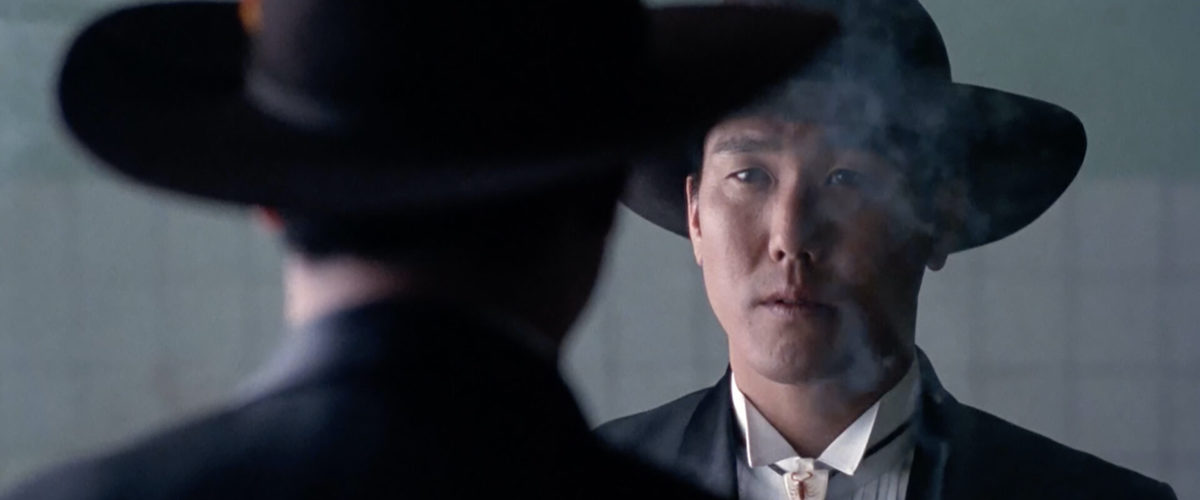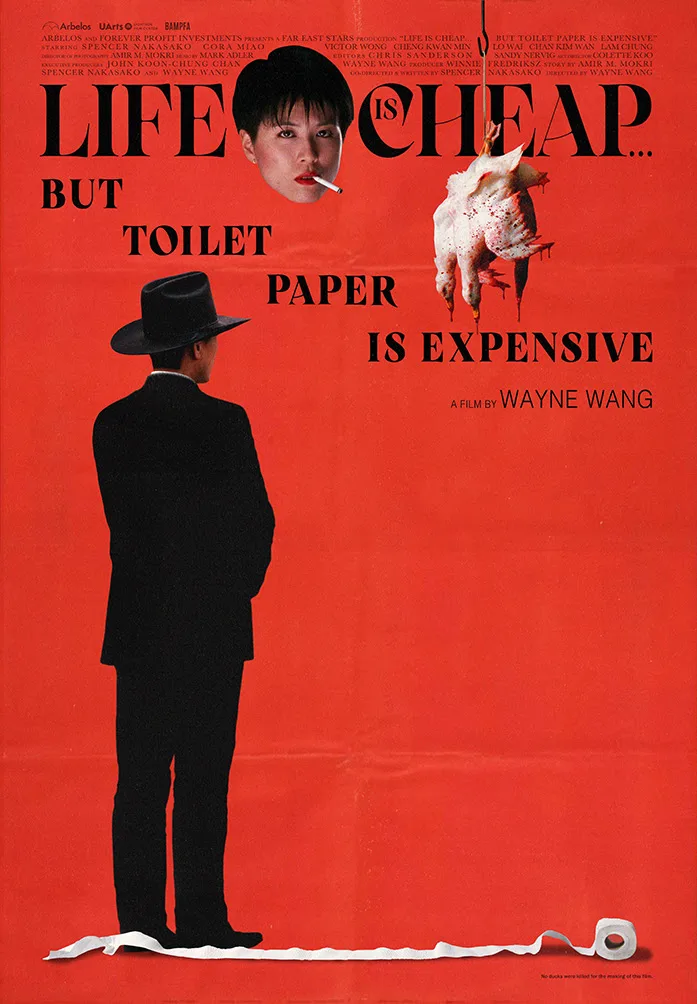Director Wayne Wang’s versatility has never failed to impress. From his debut film, the low-budget mystery-comedy “Chan is Missing,” to the ensemble family dramas “Eat a Bowl of Tea” and “The Joy Luck Club” and “Maid in Manhattan” to the psychosexual drama “The Center of the World” and the indie ensembles “Smoke” and “Blue in the Face,” he seems to be comfortable doing everything. His fluidity evokes the sorts of craftsmen who moved from project to project during the heyday of Old Hollywood studios, when the same director might helm a Western, a tragic romance, and a detective movie during the same year.
Wang’s 1989 film “Life is Cheap … but Toilet Paper is Expensive”—which is getting a brief, limited theatrical release to celebrate its 4K restoration by the filmmaker—is a kinda mystery thriller, in the way that Jean Luc-Godard’s debut “Breathless” is kinda the story of lovers on the run. The film follows a quiet, intense, handsome young man (Spencer Nakasako) in a black cowboy hat who has been hired to transport a silver briefcase of unknown contents from the United States to Hong Kong and give it to its intended recipient. It’s a variation on a hardboiled crime drama plot featured in the likes of “Kiss Me Deadly,” “Repo Man,” and “Pulp Fiction.” It’s also Wang’s own version of “Breathless” or a 1970s/’80s American New Wave directorial statement by someone like Martin Scorsese or David Lynch who looked at Godard and saw total creative freedom (there are characters in the film named Taxi Driver and Blue Velvet).
But Wang is no more interested in plot for its own sake than Godard was; the architecture of this film is obsessively fragmented. The movie less often evokes mid-century arthouse classics (such as Godard’s sci-fi detective pastiche “Alphaville”) than the sorts of brilliant but difficult films Godard made deep in his career, when he’d lost most of his original audience by going abstract and political (and often borderline-impenetrable) but didn’t care because he was immersed in the art that only he could make.
“Life is Cheap” became briefly notorious after it received an X rating from the Motion Picture Association of America, for bloody violence and intense sexuality (including a scene where the hero visits another character in a recording studio where a scene of pornographic sex between a man and a woman is being dubbed by two men, one of whom attempts a “girlish” falsetto). Shaken but unfazed, Wang’s distributor released the film with an invented rating, “A” for adult, two years before the MPAA created the NC-17, which was meant to indicate the more artistic kinds of “extreme” mainstream cinema that would appear very briefly in the ’90s. The movie is somehow hardcore-edgy and playful at the same time. Sometimes these tendencies cancel each other, but most of the time they amplify each other.
We often hear the hero of “Life is Cheap” narrating in hardboiled voice-over. He describes his mission, the people he meets, and his observations about life in the neon dream city in the years before the British handed it over to China. He wonders what’s in the briefcase and why its intended recipient behaved in such an odd fashion.
But then the movie will go long stretches without any narration, or without even seeing the hero. What story there is gets interrupted (from the very beginning of the movie!) by disruptive flash-cuts. Some are barely visually legible: a flash of red; a glimpse of what might be the leader on a reel of film. Others are disturbing. Many sequences let supporting characters address the camera, which represents the hero, and Wang stays on them for so long that they turn into little documentary-style character portraits of eccentrics and possibly dangerous individuals, from the man who offers tutorials on “sexy dancing” to the porno producer who is casually accused of an awful crime. There’s a recurring close-up image of a man’s hand being cut off with a meat cleaver at the wrist, its chopped bones and oozing veins visible to the camera, as well as a long shot of a severed hand on a pristine white hospital bed and a white ceramic bowl full of watered-down blood nearby. Are we seeing the hero’s fate? Is the entire movie a deathbed recollection—or a premonition?
For the re-release, Wang has also added never-before-seen, low-resolution video footage he shot on location in Hong Kong during production. The material appears mainly in a long, unheralded and unexplained block of footage roughly a third of the way through. We see actors that we encountered in character previously, on location. They seem to be rehearsing. There’s also footage of ordinary Hong Kong street life, including a butcher at work, and a man on a gurney being loaded into the back of an ambulance by paramedics. You could say this material ruins any concept or proper commercial pacing if there were any indication that Wang prized such things. To be specific, he does care about an audience-pleasing pace, very much—in his other films. Not so much in this one, which adheres to its own internal metronome, and in some ways feels like an inversion of some of his concerns in “Chan is Missing,” a classic indie about then-modern-day Chinese-Americans and a meditation on assimilation.
This is a difficult movie to watch at times—and for decades it has been hard to see, period. It’s not the sort of film one can fairly judge by any conventional criteria. It has a punk rock sensibility that links it to other notable films by major new indie directors who came up in the ’80s and ’90s, like Gus Van Sant (“My Own Private Idaho“), Alex Cox (“Repo Man”), Jane Campion (“Sweetie“), and Gregg Araki (“The Doom Generation“), as well as high-profile studio ringers like Scorsese and Oliver Stone (including the latter’s “Natural Born Killers” and “U-Turn“). It seems to be a completely uncompromised movie, with all the qualities that phrase suggests.
Now playing at BAM.




















